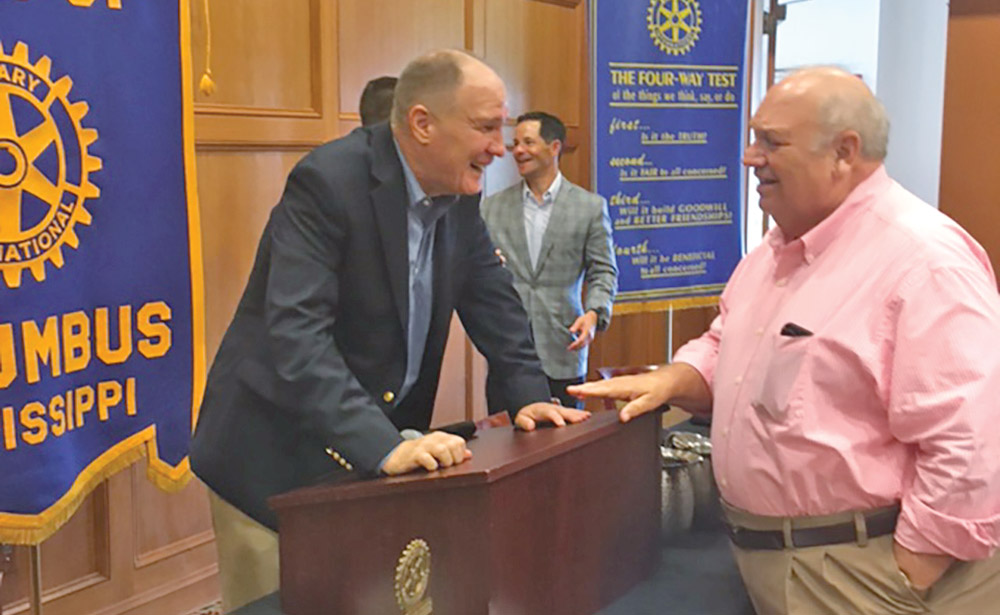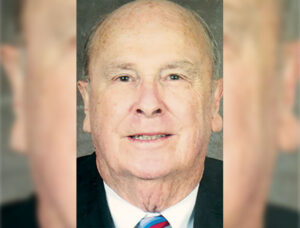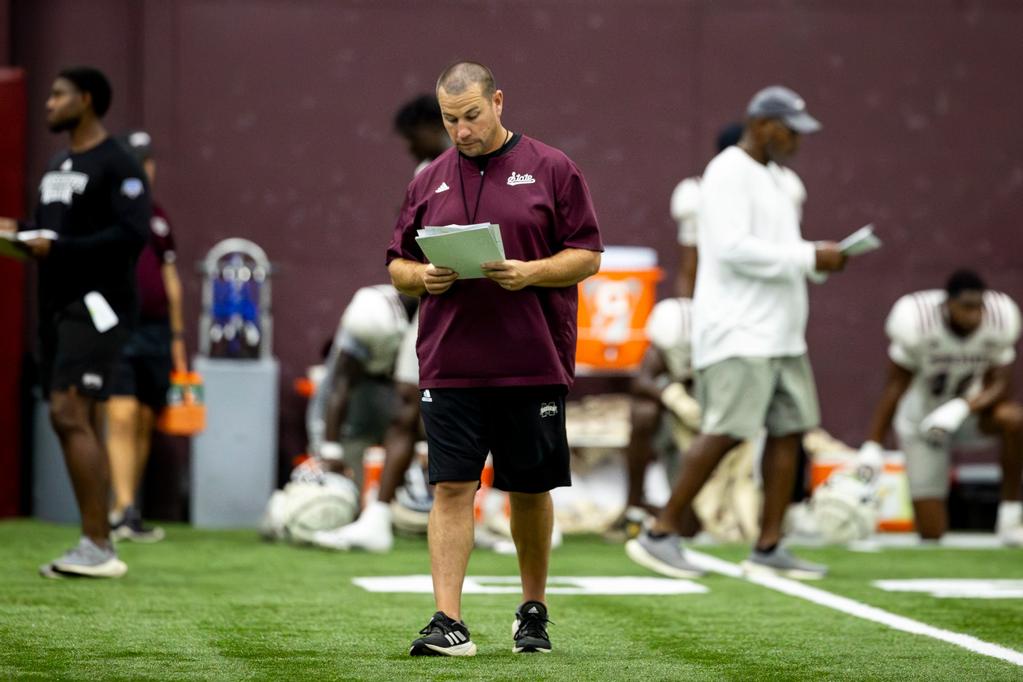First District Rep. Trent Kelly (R-Mississippi) talked about the importance of COVID-19 vaccinations, accountability for the Jan. 6 storming of the Capitol and the complexities of immigration during a speech Tuesday to the Columbus Rotary Club at Lion Hills Center.
First elected in 2015, Kelly is a member of the House Armed Services Committee, serving as Ranking Member of the Subcommittee on Intelligence and Special Operations. He also serves on the Budget and Agriculture Committees.
Kelly stressed the importance of getting vaccinated against COVID-19, particularly with the emergence of the virus’ Delta variant. He cited several statistics that indicate being vaccinated reduces health risks, transmitting the virus to others and the potential for hospitalization, even death.
He said he hopes people become more confident about receiving the vaccine after the federal Food and Drug Administration fully approves it. All three vaccines — Pfizer and BioNTech, Moderna, and Johnson & Johnson — have been given an emergency use authorization (EUA), which FDA offers during crises as a quick way to give people access to potentially lifesaving medicines. He said politics should not be a barrier for getting vaccinated because being vaccinated will absolutely save lives.
“Regardless of where you stand on that (vaccination), if you don’t want to get them, don’t get them. But I’m just telling you for your own personal good that I think it’s a benefit,” said Kelly, who was vaccinated earlier this year. “I think it’s important that we not politicize this, and also think it’s important that people are able to have the freedoms to choose those things.”
Border policy
In June, Border Patrol recorded more than 188,000 people attempting entry along the southwest border, according to the U.S. Customs and Border Protection Agency. That represents a 471-percent increase from June 2020 during the height of the pandemic. Border arrests have already reached their highest since 2000 and are on track to reach 1.8 million this year.
“That is such a complex problem but number one, I’ve always been for controlling our borders and I don’t care whether it’s our northern borders,” Kelly said. “I don’t care whether it’s our southern border. I don’t care whether that’s airports or ports that ships come into. We have a duty to know who’s coming into this country. We also have a duty to protect our citizenry above any other.”
Kelly said he doesn’t agree with policies that allow people into the country even after being tested positive for COVID-19. He said the “cages” at the border where people are held are at 190 percent capacity and are rampant with the spread of the coronavirus.
“I think what you have to do is if you don’t like the policies of the current administration, I think you have to change the administration,” he said.
Kelly said while there needs to be more control over the immigration and naturalization process, efforts also need to be made to distinguish between people who come to work from the southern border but have no intention of becoming U.S. citizens.
“The majority of people who come to America don’t want to be a United States citizen,” he said. “They want to come here and work. and we need them in some of those jobs that, quite frankly, a lot of our folks will not do. So make it easier to come here and own a work visa so we get to tax and we get to see our benefits from it, but you don’t get to come here illegally, and you don’t get to just come and stay because you want to.”
Kelly described the border crisis as a complex problem without easy solutions.
“We say it is not an easy problem to solve,” he said. “If it was easy, it would’ve already been done. Trust me, when the Republicans were in charge … we were within three votes of doing immigration reform. There’s a reason that immigration hasn’t been touched since Ronald Reagan was president. And that’s because it’s a complex problem.”
Jan. 6 investigation
Kelly shared his thoughts about what occurred Jan. 6 when a mob stormed Capitol Hill. He called for a non-partisan investigation that will hold people in charge accountable, be it federal authorities, Capitol police and anyone who could affect decision making when issuing orders.
“I think that had there been a hard response ready, there would not have been the breach of the Capitol,” he said. “I think there’s a lot of accountability. I think there’s a lot of questions that need to be asked and answered. I don’t think it needs to be done in a partisan way.”
Kelly said there had to have been intelligence failure somewhere that opened the door to these events.
“Either someone didn’t know and should have known, or either someone was told and didn’t respond,” he said.
Kelly said he knows Maj. Gen. William Walker, now the sergeant at arms for the Capitol, formerly commander of the District of Columbia National Guard.
During the Jan. 6 riot, Walker sent D.C. Guard members to back up the Capitol Police, who were unable to stop a mob of former President Donald Trump’s supporters from breaching the Capitol. During hearings into how the breach occurred, Walker was critical of the time it took for the Pentagon to approve his request to deploy his troops to help quell the riot.
“He’s an old friend of mine and I can tell you they were ready. They (National Guard) did not get the call,” said Kelly, a major general in the Army National Guard. “There were things above them, so there needs to be some accountability of who didn’t know, who should have known and who delayed those folks getting there that got to the point that it was.”
You can help your community
Quality, in-depth journalism is essential to a healthy community. The Dispatch brings you the most complete reporting and insightful commentary in the Golden Triangle, but we need your help to continue our efforts. In the past week, our reporters have posted 43 articles to cdispatch.com. Please consider subscribing to our website for only $2.30 per week to help support local journalism and our community.







